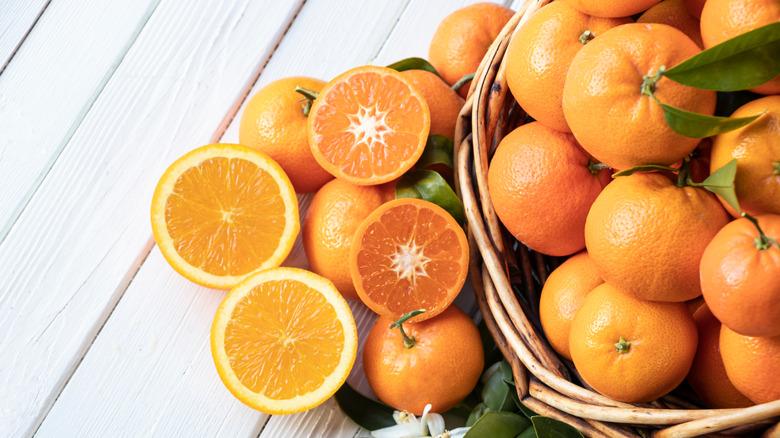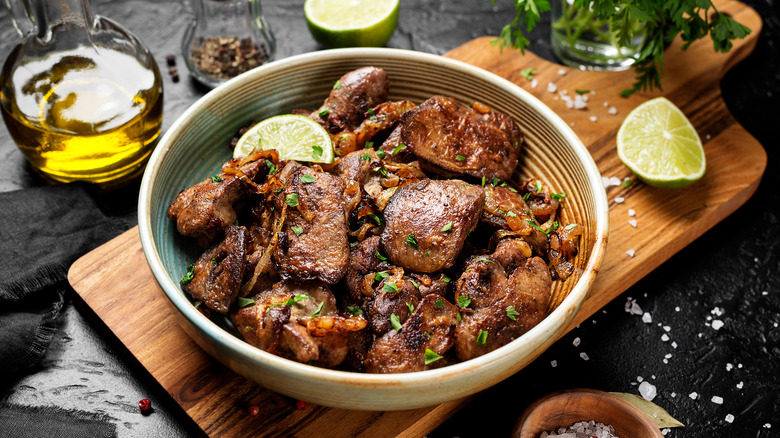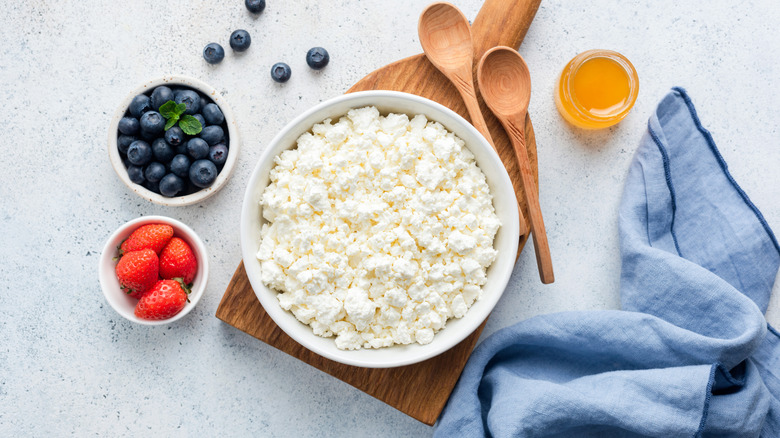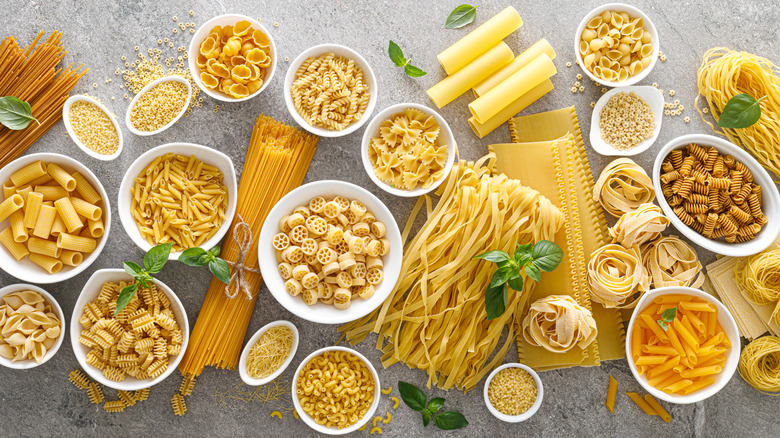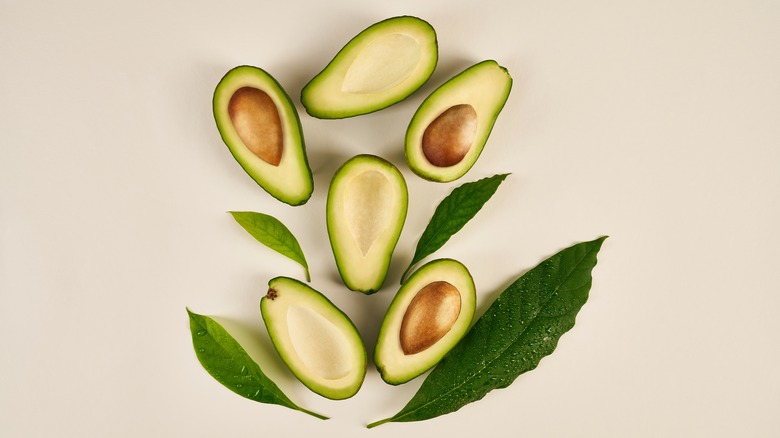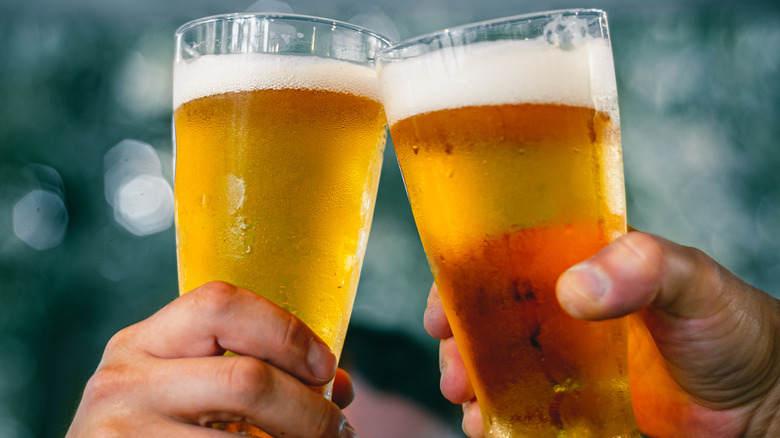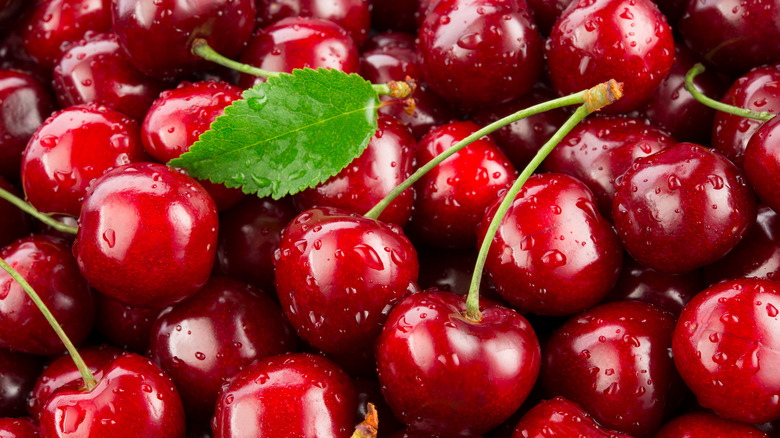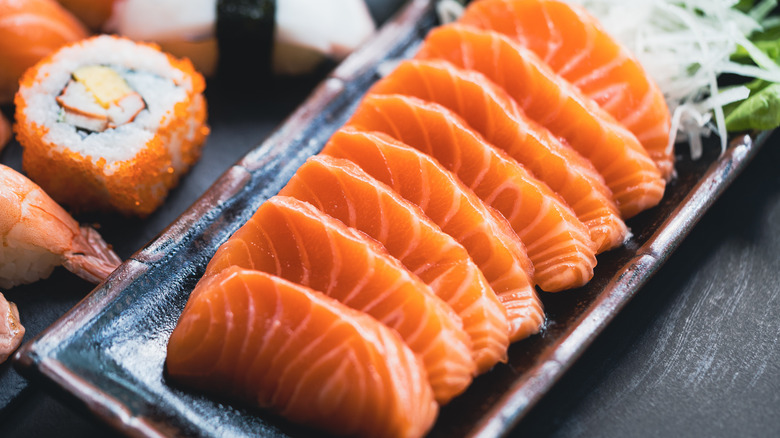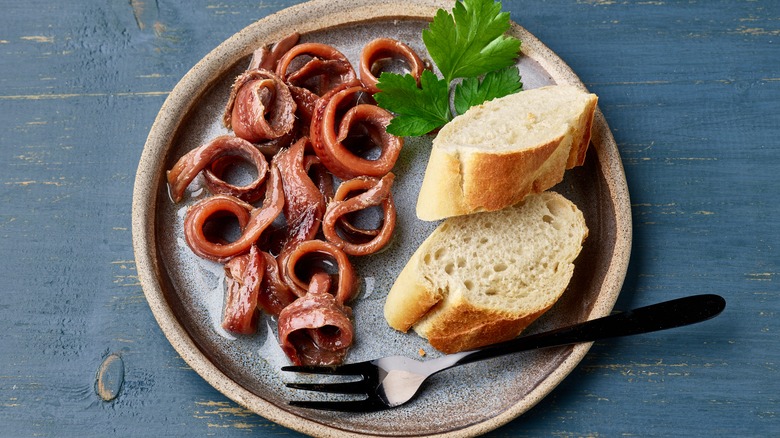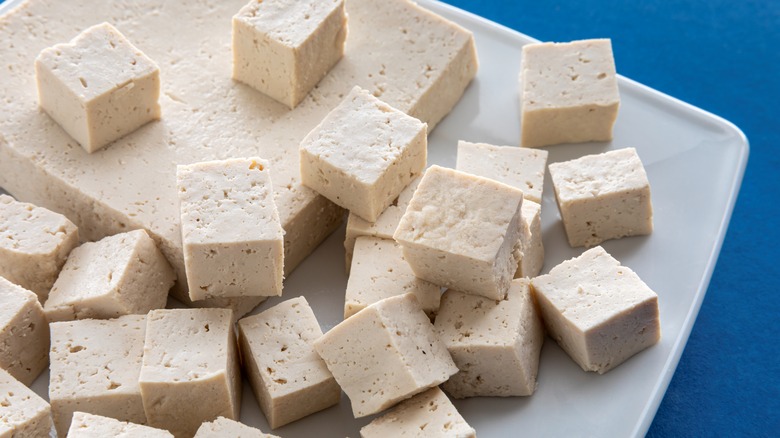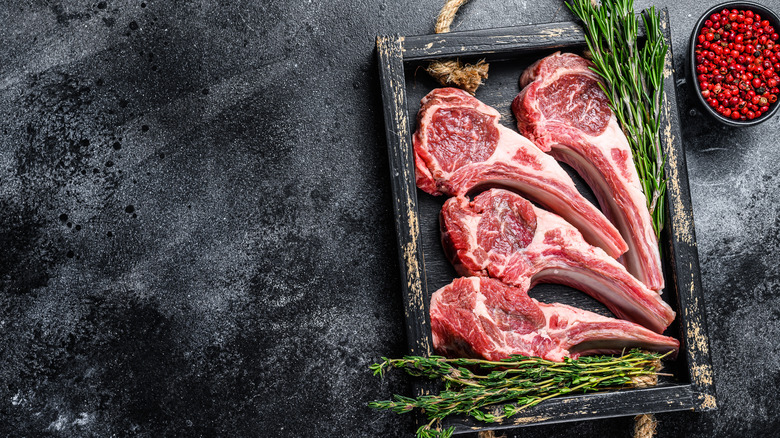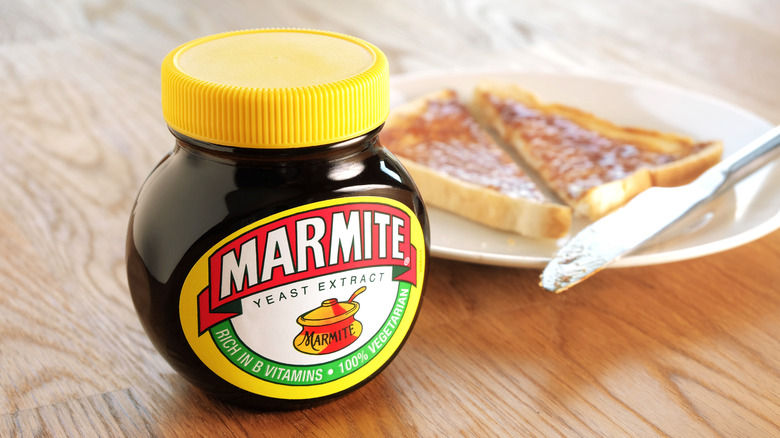7 Foods To Eat And 7 Foods To Avoid For Gout
Having gout can be seriously impactful. A type of inflammatory arthritis, gout is a condition that affects your joints through the formation of uric acid crystals, caused by excess uric acid in your system (per the Cleveland Clinic). These needle-shaped acid crystals then create swelling in your joints and cause painful episodes that can last for as much as two weeks.
While anybody can experience gout, certain lifestyle factors can both increase your likelihood of developing the condition and worsen your symptoms when you have it. And with cases of gout rising around the world (via research published in Nature Reviews Rheumatology), it's important to be aware of how to manage the condition. Family history of gout, as well as other risk factors like diabetes, obesity, kidney disease, and hypertension, can all raise the chance of you having it at some point in your life. But one huge aspect of gout risk and management is your diet. Certain foods we might choose to eat can ease symptoms of gout — and some can make it seriously worse. Let's take a look at some of the top foods to eat and avoid for this tricky condition.
Eat: Oranges
When you're not feeling your best, it's pretty common to reach for a bag of oranges. But this citrus fruit can help with way more than just a case of the sniffles. With their impressive vitamin C content, oranges may be your best friend when it comes to gout, due to the vitamin's ability to help bring down your levels of uric acid, responsible for promoting crystal formation that causes painful gout attacks (per the Arthritis Foundation).
Importantly, too, oranges contain lower levels of fructose, a type of naturally occurring fruit sugar that can end up increasing your chance of gout attacks. It's for this reason that other vitamin C-rich, low-fructose fruits like strawberries, pineapples, and grapefruit could be good choices for a gout-friendly diet. If you're having difficulty getting the levels of vitamin C needed from your diet alone, it may also be worth supplementing your intake with extra vitamin C, as research published in the Archives of Internal Medicine shows. The same research indicates that the more vitamin C you're getting, the more your protection from gout increases.
Avoid: Liver
When it comes to gout, a diet rich in meat is often named as one of the main culprits of painful attacks. But according to rheumatologist Scott Burg, speaking to the Cleveland Clinic, eating meat is not entirely incompatible with having gout, as long as you're keeping your meat consumption fairly limited.
What you might have to consider avoiding, though, is certain types of meat, like liver. Organ meats like liver are way richer in purines, a type of chemical compound that, when ingested, is broken down in your body into uric acid, says WebMD. When you eat foods that have higher levels of purines in them, your uric acid levels start to build up, and this then contributes to the formation of the crystals that cause gout pain. Instead of opting for organ meat, you're far better off going for leaner cuts of white meat, like turkey or chicken (via Cleveland Clinic). These types of meat are lower in purines, and so should be way less likely to cause uric acid buildup in your system.
Eat: Low-fat cottage cheese
If you're having to consider your diet because of gout, the question of what to snack on can be a difficult one. But low-fat cottage cheese might come to the rescue, folks. Low-fat or no-fat cottage cheese is the ideal snack for people with gout, thanks to its effects on the uric acid in your system, according to Healthline. Low-cat cottage cheese can assist your body in expelling excess uric acid from your body via your urine, thereby helping to manage the levels in your body and avoid the formation of acid crystals.
Notably, this isn't just the case for low-fat cottage cheese, but for all low-fat dairy products, meaning that fat-free yogurt and low-fat or skim milk are also still on the menu. If you're a cheese fan (and let's face it, who isn't?), you may also be able to find low-fat versions of your favorite variety. If you're eating higher-fat dairy products as part of your protein intake, replacing that protein source with pulses like lentils or bean-based products could be an option too.
Avoid: Pasta
Ah, pasta. How we love you. And how disappointed we are that you're not good for gout. Unfortunately, eating higher amounts of pasta, as well as other refined carbohydrates like white rice and white pasta, may not be the best choice if you're trying to control gout symptoms, says Healthline. These foods have a high glycemic index, and higher-GI foods contribute to increased uric acid levels in the body, therefore making gout attacks more frequent and unpleasant, according to research published in Arthritis & Rheumatology.
But! All's not lost on the carb front for those with gout. Opting for whole-grain carbs may help you get your carb fix without causing your uric acid levels to rise too high, according to the Arthritis Foundation. It's worth bearing in mind, however, that whole grains aren't totally harmless for people with gout. As Healthline points out, they still contain a moderate amount of purines, which can boost your uric acid levels, so it's important not to overindulge in them.
Eat: Avocado
Honestly, we can't speak highly enough of the avocado. Along with being totally, indisputably, delightfully delicious, a daily portion of avocado will provide a combo of monounsaturated fat and dietary fiber that will, among other things, assist in maintaining healthy cholesterol levels, controlling blood sugar, and keeping you full (per Healthline).
And if that wasn't enough? Avocado is one of the best things you can include in your diet if you have gout. Avocados are low in purines, the compound you need to watch out for if you have gout. And additionally, it's their premium antioxidant content that can set you up for success in the dietary stakes. As research published in Oxidative Medicine and Cellular Longevity shows, the anti-inflammatory effects of antioxidants can help manage symptoms of gout, as well as other inflammatory diseases. To top it all off, avocados are also an excellent source of vitamin E, another nutrient that plays an important part in anti-inflammatory functions. Pass us that guac!
Avoid: Beer
So, we don't want to kill your buzz. Really, we don't. But if you're experiencing gout, we may have to, at least on the beer front. "Beer is on the 'no' list for people who have gout," says University of Texas Southwestern Medical School in Dallas associate professor and American Dietetic Association spokesperson Lona Sandon to Everyday Health. Beer is particularly impactful on people who have gout because of its high content of guanosine, a purine that can wreak havoc on your joints (per Medical News Today).
So, what about subbing out your beer for other types of alcohol? Well, unfortunately, folks, it may not be as simple as that. According to research published in The American Journal of Medicine, the more alcohol you drink, the more likely you are to experience gout attacks – regardless of the type of booze you're enjoying. The researchers ultimately concluded that reducing your alcohol intake entirely was the best course of action to help avoid gout attacks.
Eat: Cherries
Who'd have thought that a simple cherry could do so much good? But for those with gout, the cherry may be a tiny flare-fighting powerhouse, according to research published in Arthritis & Rheumatology. The research looked at the link between cherry consumption and the recurrence of gout attacks, as well as what happened when people ingested cherry extract. The researchers conducting the study found that after subjects consumed cherries or cherry extract for just a few days, they had a decrease in the likelihood of being hit with an attack of gout — a 35% lower chance, in fact. And the effects got even more potent when subjects ate cherries alongside taking the gout medication allopurinol — this combo led to a 75% drop in likelihood of having a gout attack.
So why are cherries so good for you on the gout front? Researchers posited a few theories as to why. Cherries appear to lower your uric acid levels, meaning that your body forms less of the materials that cause gout attacks. Another reason could be due to their high levels of antioxidants called anthocyanins, which may have an anti-inflammatory effect.
Avoid: Soda
A cool, refreshing soda may be your go-to drink on a hot summer's day, but if you're experiencing gout, we seriously recommend giving it a miss — especially if it's the full-sugar variety. Many sodas get their sweet flavor from the addition of fructose, usually through using high fructose corn syrup, according to research published in Nutrition. Unfortunately, fructose consumption — including through sweetened beverages specifically — has been linked to a higher prevalence of gout and higher uric acid levels in the body, states a review published in Seminars in Nephrology. The review authors recommend that limiting these types of drinks may be a course of action for the reduction of gout across the board.
However, for soda-lovers out there, there's some good news. Although a further study published in Arthritis & Rheumatology also indicated that frequently drinking soda appears to be linked to hyperuricemia (high uric acid levels), this association did not hold true for diet sodas. So, if you're concerned about gout, it might be worth switching to Diet Coke instead of that classic red can.
Eat: Salmon
There's a lot of discussion around the consumption of fish for gout: With several types of fish such as anchovies, herring, and mackerel being high in purine content, they can be a nightmare for people with the condition. That said, "Salmon appears to be an exception and a better choice of seafood for someone with gout," states University of Texas Southwestern Medical School in Dallas associate professor and American Dietetic Association spokesperson Lona Sandon to Everyday Health.
Now, this may be a bit unexpected given that salmon is among the fish that have higher purine content (via Verywell Health). So, what exactly makes salmon a gout-friendly option? While there could be several reasons why this is the case, one of them might be because of salmon's unparalleled omega-3 content, the consumption of which has been observed to assist in lowering the risk of gout flare-ups, as per a study published in Arthritis & Rheumatology.
Avoid: Anchovies
Not all fish are created equal, and anyone who's compared the size of an anchovy with a seabass can attest to that. But that tiny, salty fish you put on your pizza? Turns out it's one of the things you want to eat least when you have gout. Pound by pound, anchovies actually have the highest purine content of any fish out there, according to Verywell Health. Although it should be pointed out that you're probably not going to be eating anchovies in the same quantities as you might eat other fish (ever tried to eat more than a few at a time? Phew. Intense.), it's still important to keep in mind next time you're checking out the Domino's menu.
Other high-purine offenders on the seafood front are trout, tuna, halibut, and sardines. And interestingly, how fish is cooked can affect its purine content considerably, with steaming or poaching fish resulting in a lower-purine meal than other methods.
Eat: Tofu
Just when we thought we couldn't love tofu any more, it turns out that it's good for people who have gout. Just sign us up for a lifetime supply right now, people! Tofu is an optimal choice on a diet that's designed for gout thanks to its ability to supply protein while keeping your purine intake low, according to Northwest Kidney Centers. This places it at a significant advantage over various types of animal protein, which deliver that essential macronutrient but also boost your uric acid levels.
The low-purine nature of tofu comes from the fact that the soybeans it's made from don't contain much of the compounds, and this is, naturally, pretty good news for anybody following a plant-based diet. By that same token, soy-based foods like soy milk or soy protein shakes can be safely incorporated into a gout-friendly diet. Incredibly, eating soy sauce has even been found in one study published in the Journal of Agricultural and Food Chemistry to lower levels of uric acid in rats.
Avoid: Lamb
Lamb is a mainstay in dishes around the world, but if you're eating for gout, it's best left avoided. Lamb is particularly high in purines, the ingestion of which results in an increased likelihood of gout attacks, says Livestrong. This is also the case with other red meats like beef, pork, and goat, all of which can stimulate excess uric acid production and uncomfortable gout symptoms. As gout can be common in people who have kidney disease, it's especially important to watch your intake of red meats like lamb if you have concerns about your kidneys, as lower kidney function and red meat consumption appear to go hand-in-hand, according to research published in the Journal of Renal Nutrition.
It's also worth watching your protein intake in general if you have gout, as you may be consuming more than you need, according to Beth Israel Deaconness Medical Center registered dietitian Sandra Allonen via the Arthritis Foundation. Allonen advises that you'll need roughly 54 grams of protein daily if you weigh 150 pounds (about what you'd get in a 6-ounce breast of chicken). She also notes that for those with gout, it may be preferable to lean toward alkaline proteins, which tend to be more common in plant-based food sources.
Drink: Coffee
For many people (ourselves included), a steaming cup of coffee is the only way to start the day properly. So it's good news for people with gout that coffee may still be on the menu, according to research published in Arthritis & Rheumatology. The study looked at over 45,000 men and the relationship between gout incidence and coffee consumption over 12 years. It was concluded that for people who drank coffee, the likelihood of developing gout was lower.
Why is this the case? "There is a theory that a component of coffee, chlorogenic acid, an antioxidant, may actually be the reason that coffee is associated with a lower incidence of gout," states Women's Orthopedic and Joint Disease Program at Brigham and Women's Hospital director Elinor Mody to the Arthritis Foundation. Chlorogenic acid may aid in bringing insulin levels down, and there's a close connection between your insulin levels and how much uric acid you have in your system. However, if you're reading this and running to buy a premium-size coffee pot for the first time, it may not all be good news. Suddenly boosting your caffeine intake may make gout symptoms worse if you're not already a regular coffee or tea drinker, as the Arthritis Foundation discusses, due to the potential acute effects of caffeine on the system.
Avoid: Yeast
Yeast is a cornerstone of a huge number of popular foods, from pizza dough to beer. If you have gout, though, you may want to reconsider how much of the substance you're consuming, as it may provoke painful gout symptoms. Some yeasts and yeast extracts (like brewer's yeast) are notably high in purines, according to Verywell Health, making them a poor choice for the management of gout.
This means that foods like sandwich spreads made with yeast extracts (such as Marmite) should be considered off-limits (via Versus Arthritis). Especially yeasty loaves of bread may also be something you want to avoid, although yeast-free flatbreads like chappatis might be a good choice, says Andrea's Digestive, Colon, Liver and Gallbladder Clinic. Interestingly, certain fermented beverages made with yeast strains, like kombucha, may provide help for gout symptoms (per Prevention), but as always, it's important to monitor your reactions to what you consume and how it affects your gout.


